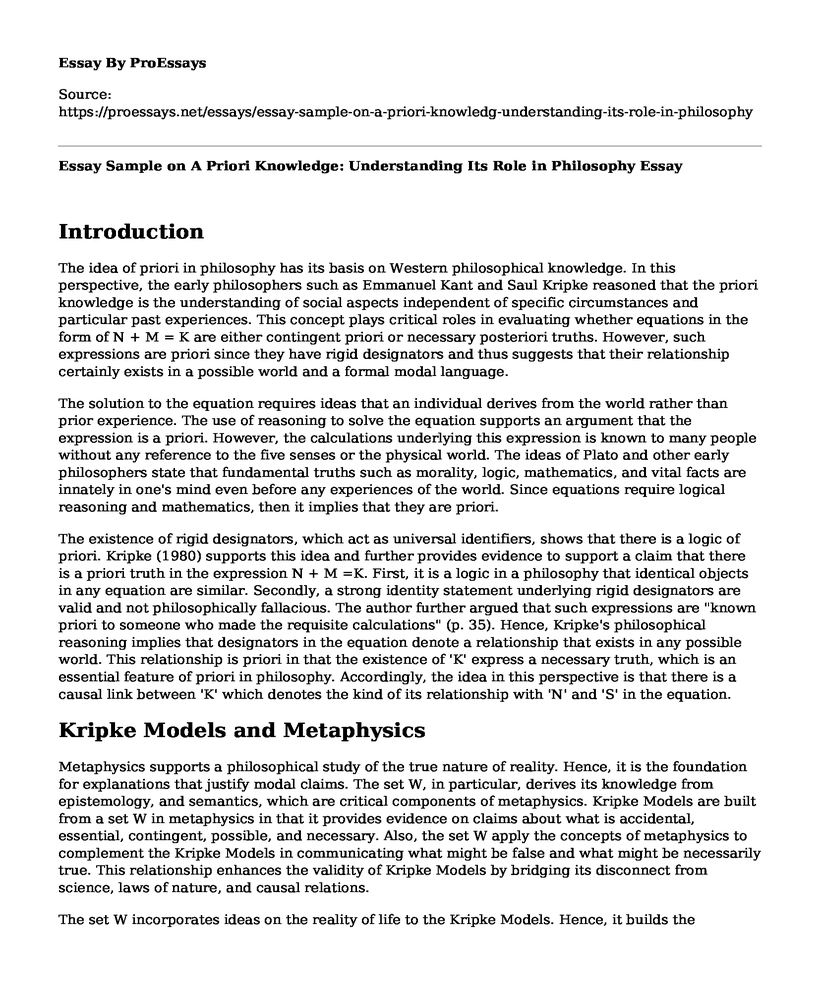Introduction
The idea of priori in philosophy has its basis on Western philosophical knowledge. In this perspective, the early philosophers such as Emmanuel Kant and Saul Kripke reasoned that the priori knowledge is the understanding of social aspects independent of specific circumstances and particular past experiences. This concept plays critical roles in evaluating whether equations in the form of N + M = K are either contingent priori or necessary posteriori truths. However, such expressions are priori since they have rigid designators and thus suggests that their relationship certainly exists in a possible world and a formal modal language.
The solution to the equation requires ideas that an individual derives from the world rather than prior experience. The use of reasoning to solve the equation supports an argument that the expression is a priori. However, the calculations underlying this expression is known to many people without any reference to the five senses or the physical world. The ideas of Plato and other early philosophers state that fundamental truths such as morality, logic, mathematics, and vital facts are innately in one's mind even before any experiences of the world. Since equations require logical reasoning and mathematics, then it implies that they are priori.
The existence of rigid designators, which act as universal identifiers, shows that there is a logic of priori. Kripke (1980) supports this idea and further provides evidence to support a claim that there is a priori truth in the expression N + M =K. First, it is a logic in a philosophy that identical objects in any equation are similar. Secondly, a strong identity statement underlying rigid designators are valid and not philosophically fallacious. The author further argued that such expressions are "known priori to someone who made the requisite calculations" (p. 35). Hence, Kripke's philosophical reasoning implies that designators in the equation denote a relationship that exists in any possible world. This relationship is priori in that the existence of 'K' express a necessary truth, which is an essential feature of priori in philosophy. Accordingly, the idea in this perspective is that there is a causal link between 'K' which denotes the kind of its relationship with 'N' and 'S' in the equation.
Kripke Models and Metaphysics
Metaphysics supports a philosophical study of the true nature of reality. Hence, it is the foundation for explanations that justify modal claims. The set W, in particular, derives its knowledge from epistemology, and semantics, which are critical components of metaphysics. Kripke Models are built from a set W in metaphysics in that it provides evidence on claims about what is accidental, essential, contingent, possible, and necessary. Also, the set W apply the concepts of metaphysics to complement the Kripke Models in communicating what might be false and what might be necessarily true. This relationship enhances the validity of Kripke Models by bridging its disconnect from science, laws of nature, and causal relations.
The set W incorporates ideas on the reality of life to the Kripke Models. Hence, it builds the underlying models by using the foundation of the existing explanations to make it a comprehensive theory in philosophy. This relationship suggests that the set W use the critical components of metaphysics such as universal science, natural theology, and ontology to give Kripke Models robust theoretical backgrounds and sound philosophical judgment. Kripke (1980) further corroborates that "all analytic judgments depend wholly on the law of contradiction" (p. 117). To give the author's view a deep thought, it is no doubt that analytical metaphysics, in particular, create causal relations by establishing counterfactual dependence between the underlying events of the model. Also, one can conclude that the idea of metaphysics enhances the link between a natural phenomenon and the knowledge of Kripke theories. However, the set W has no restrictions on the domains of the world and thus suggests that it builds the Kripke model by creating a link to the laws of nature.
Conclusion
Conclusively, analytic and systematic metaphysics are the primary components that built the Kripke Models from the set W. It improves the models by incorporating the ideas of metaphysics about the relations between universals, aspects about the laws of nature and modal facts on other possible worlds.
References
Kripke, S. A. (1980). Naming and Necessity. Cambridge, MA: Harvard University Press. Retrieved 25 May 2019, from https://academiaanalitica.files.wordpress.com/2016/10/kripke-saul-a-naming-and-necessity-cambridge-harvard-university-press-1981.pdf/url.
Cite this page
Essay Sample on A Priori Knowledge: Understanding Its Role in Philosophy. (2023, Jan 16). Retrieved from https://proessays.net/essays/essay-sample-on-a-priori-knowledg-understanding-its-role-in-philosophy
If you are the original author of this essay and no longer wish to have it published on the ProEssays website, please click below to request its removal:
- Introduction to Ethics in Decision Making
- Cancer Among Asian Americans Essay
- Research Paper on Immanuel Kant and the Categorical Imperative
- The Meaning of Life: Examining Whyte's Argument - Essay Sample
- Essay Sample on IRB: Safeguarding Human Research Participants
- Biography Sample on Jane Addams: Champion of Peace, Philanthropy, Work Ethic
- Worldview on a Counsellor's Therapeutic Process - Paper Example







